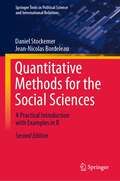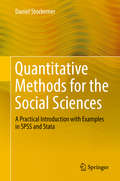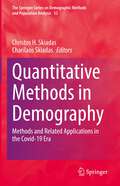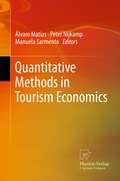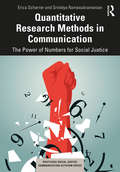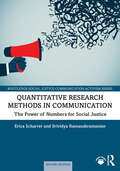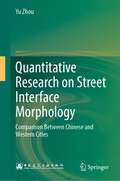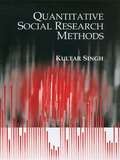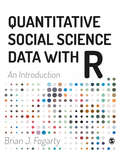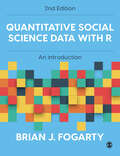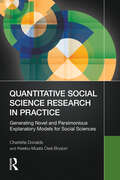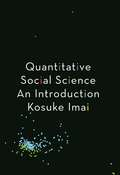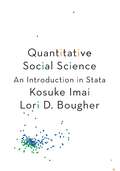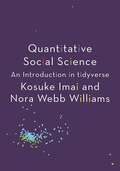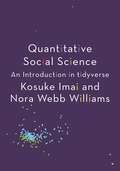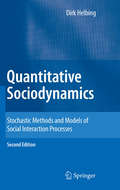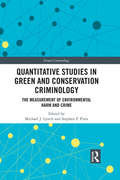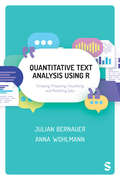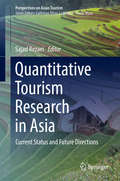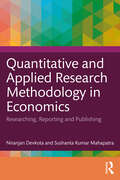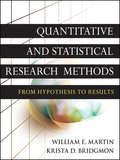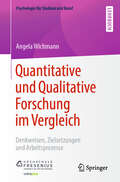- Table View
- List View
Quantitative Methods for the Social Sciences: A Practical Introduction with Examples in R (Springer Texts in Political Science and International Relations)
by Daniel Stockemer Jean-Nicolas BordeleauThis textbook offers an essential introduction to survey research and quantitative methods with clear instructions on how to conduct statistical tests with R. Building on the premise that we need to teach statistical methods in a holistic and practical format, the book guides students through the four main elements of survey research and quantitative analysis: (1) the importance of survey research, (2) preparing a survey, (3) conducting a survey and (4) analyzing a survey. In detail, students will learn how to create their own questionnaire on the basis of formulating hypotheses; sampling participants; disseminating their questionnaire; creating datasets; and analyzing their data. The data analytical sections of this revised and extended edition explain the theory, rationale and mathematical foundations of relevant bivariate and multi-variate statistical tests. These include the T-test, F-test, Chi-square test and correlation analyses, as well as bivariate and multivariate regression analyses. In addition, the book offers a brief introduction to statistical computing with R, which includes clear instructions on how to conduct these statistical tests in R. Given the breadth of its coverage, the textbook is suitable for introductory statistics, survey research and quantitative methods classes in the social sciences.
Quantitative Methods for the Social Sciences: A Practical Introduction with Examples in SPSS and Stata
by Daniel StockemerThis textbook offers an essential introduction to survey research and quantitative methods. Building on the premise that statistical methods need to be learned in a practical fashion, the book guides students through the various steps of the survey research process and helps to apply those steps toward a real example. In detail, the textbook introduces students to the four pillars of survey research and quantitative analysis: (1) the importance of survey research, (2) preparing a survey, (3) conducting a survey and (4) analyzing a survey. Students are shown how to create their own questionnaire based on some theoretically derived hypotheses to achieve empirical findings for a solid dataset. Lastly, they use said data to test their hypotheses in a bivariate and multivariate realm. The book explains the theory, rationale and mathematical foundations of these tests. In addition, it provides clear instructions on how to conduct the tests in SPSS and Stata. Given the breadth of its coverage, the textbook is suitable for introductory statistics, survey research or quantitative methods classes in the social sciences.
Quantitative Methods in Demography: Methods and Related Applications in the Covid-19 Era (The Springer Series on Demographic Methods and Population Analysis #52)
by Christos H. Skiadas Charilaos SkiadasThis book provides quantitative and applied methodologies in the Covid-19 era exploring important issues in demography, population studies, and health. It provides insight into health and health measures as to the healthy life years lost and the healthy life expectancy related to Covid-19 pandemic. It also describes mortality and survival and focuses on data analysis in demography and population studies. Special methods and applications in demography and society are also described, thereby including applications in society, pension and insurance. As such, this book is a valuable guide for researchers, theoreticians and practitioners from various scientific fields.
Quantitative Methods in Tourism Economics
by Peter Nijkamp Manuela Sarmento Álvaro MatiasTourism economics is partly based on established principles from the economics discipline, but it also incorporates elements from sociology, psychology, organization theory and ecology. It has over the years turned into an appealing multi-disciplinary oriented approach to the understanding of the impacts of leisure time in a modern society, including cultural heritage, sustainable quality of life, and industrial organization of the hospitality industry. The increasing dynamics in the tourist industry and its worldwide effects will continue to attract the attention of both the research and the policy sector in the years to come. Rather than speculating on non-observed facts, there is a clear need for evidence-based research in order to map out the complex dynamics of the tourist industry. The present volume comprises novel studies - mainly of a quantitative-analytical nature - on the supply, demand and contextual aspects of modern tourism. It contains a sound mix of theory, methodology, policy and case studies on various tourism issues in different parts of the world.
Quantitative Research Methods in Communication: The Power of Numbers for Social Justice (Routledge Social Justice Communication Activism Series)
by Erica Scharrer Srividya RamasubramanianThis textbook is an advanced introduction to quantitative methods for students in communication and allied social science disciplines that focuses on why and how to conduct research that contributes to social justice. Today’s researchers are inspired by the potential for scholarship to make a difference for society, to push toward more just and equitable ends, and to engage in dialogue with members of the public so that they can make decisions about how to navigate the social, cultural, and political world equipped with accurate, fair, and up-to-date knowledge. This book illustrates the mechanics and the meaning behind quantitative research methods by illustrating each step in the research design process with research addressing questions of social justice. It provides practical guidance for researchers who wish to engage in the transformation of structures, practices, and understandings in society through community and civic engagement and policy formation. It contains step-by-step guidance in quantitative methods—from conceptualization through all the stages of execution of a study, including providing a detailed guide for statistical analysis—and demonstrates how researchers can engage with social justice issues in systematic, rigorous, ethical, and meaningful ways. This text serves as a core or supplementary textbook for graduate and advanced undergraduate courses in research methods for communication and social sciences and fills a gap for a methods text that is responsive to the desire of scholars to conduct socially impactful research.
Quantitative Research Methods in Communication: The Power of Numbers for Social Justice (Routledge Social Justice Communication Activism Series)
by Erica Scharrer Srividya RamasubramanianThis fully updated second edition offers an advanced introduction to quantitative methods that focuses on why and how to conduct research that contributes to social justice.Providing both inspiration and step-by-step guidance on how to conceive, design, and carry out a quantitative study, the book shows how research can be used to work toward a more just and equitable world. The authors provide a detailed guide to quantitative methods and statistical analysis, showing how researchers can engage with social justice issues in systematic, rigorous, ethical, and meaningful ways. This new edition includes a new chapter on writing literature reviews and better aligns with the stages of quantitative research as well as the changing technologies that are available for researchers to both study and use in their work. It includes updated real-world case studies, interviews with scholar-activists, and definitions of key concepts as well as a deeper focus on ethics, social media, computational social sciences, data analytics, and data visualization techniques.Attuned to questions of access, equity, justice, diversity, and inclusion, this textbook is ideal for graduate and advanced undergraduate courses in research methods for communication and the social sciences. It will also be of interest to researchers who wish to engage with the transformation of structures, practices, and understandings in society through community and civic engagement and policy formation.Online resources for instructors include a test bank, PowerPoint slides, sample dataset, and YouTube tutorials. They are available online at www.routledge.com/9781032599878.
Quantitative Research on Street Interface Morphology: Comparison Between Chinese and Western Cities
by Yu ZhouThis book investigates the historical evolution, regional differences, and quantitative measurement on street interface, which forms the street space and plays a very important role in urban form. Empirical research reveals the street interface in Chinese cities are much more complicated than European and American cities. This book explores the reason and reveals the relationship between street interface and urban form in morphology. By constructing quantitative measurement method on street interface morphology, quantitative parameters can be used in urban planning guidelines in China. Both researchers and students working in architecture, urban design, urban planning and urban studies can benefit from this book.
Quantitative Social Research Methods
by Kultar SinghQuantitative Social Research Methods explores the entire spectrum of quantitative social research methods and their application, with special reference to the development sector. It provides detailed coverage of all statistical research and analysis method with an emphasis on multivariate analysis techniques, such as regression discriminant analysis, logistic regression, factor, factor, cluster, correspondence and conjoint analysis. The book is thematically arranged in two sections: the first section introduces development research techniques, explores the genesis and scope of social research, research processes and then goes on to explain univariate, bivariate and multivariate data analysis with the help of software packages such as SPSS and STATA. The second focuses on the application of social and development research methods in the development sector. It explores research method application and the issues relevant to aspects of development such as population, health and nutrition, poverty and rural development, education, water and sanitation, and environment and natural resource management.
Quantitative Social Science Data with R: An Introduction
by Brian J Fogarty"A great, action-oriented book for novice data analysts. If you have no background in quantitative social science, Fogarty's book gives you a toolbox for starting statistical analysis and developing your skills" - Jamie Monogan, Associate Professor of Political Science, University of Georgia Relevant, engaging, and packed with student-focused learning features, this book provides the step-by-step introduction to quantitative research and data every student needs. Gradually introducing applied statistics and R, it uses examples from across the social sciences to show you how to apply abstract statistical and methodological principles to your own work. At a student-friendly pace, it enables you to: - Understand and use quantitative data to answer questions - Approach surrounding ethical issues - Collect quantitative data - Manage, write about, and share the data effectively Supported by incredible digital resources with online tutorials, videos, datasets, and multiple choice questions, this book gives you not only the tools you need to understand statistics, quantitative data, and R software, but also the chance to practice and apply what you have learned. Brian J. Fogarty is a Lecturer in Quantitative Social Science on the Glasgow Q-Step Programme in the School of Social and Political Sciences at the University of Glasgow.
Quantitative Social Science Data with R: An Introduction
by Brian J Fogarty"A great, action-oriented book for novice data analysts. If you have no background in quantitative social science, Fogarty's book gives you a toolbox for starting statistical analysis and developing your skills" - Jamie Monogan, Associate Professor of Political Science, University of Georgia Relevant, engaging, and packed with student-focused learning features, this book provides the step-by-step introduction to quantitative research and data every student needs. Gradually introducing applied statistics and R, it uses examples from across the social sciences to show you how to apply abstract statistical and methodological principles to your own work. At a student-friendly pace, it enables you to: - Understand and use quantitative data to answer questions - Approach surrounding ethical issues - Collect quantitative data - Manage, write about, and share the data effectively Supported by incredible digital resources with online tutorials, videos, datasets, and multiple choice questions, this book gives you not only the tools you need to understand statistics, quantitative data, and R software, but also the chance to practice and apply what you have learned. Brian J. Fogarty is a Lecturer in Quantitative Social Science on the Glasgow Q-Step Programme in the School of Social and Political Sciences at the University of Glasgow.
Quantitative Social Science Data with R: An Introduction
by Brian J FogartyRelevant, engaging, and packed with student-focused learning features, this book provides the basic step-by-step introduction to quantitative research and data every student needs. Gradually introducing applied statistics and the language and functionality of R and R Studio software, it uses examples from across the social sciences to show students how to apply abstract statistical and methodological principles to their own work. Maintaining a student-friendly pace, it goes beyond a normal introductory statistics book and shows students where data originates and how to: - Understand and use quantitative data to answer questions - Approach surrounding ethical issues - Collect quantitative data - Manage, write about, and share the data effectively Supported by incredible digital resources with online tutorials, videos, datasets, and multiple choice questions, this book gives students not only the tools they need to understand statistics, quantitative data, and R software, but also the chance to practice and apply what they have learned.
Quantitative Social Science Data with R: An Introduction
by Brian J FogartyRelevant, engaging, and packed with student-focused learning features, this book provides the basic step-by-step introduction to quantitative research and data every student needs. Gradually introducing applied statistics and the language and functionality of R and R Studio software, it uses examples from across the social sciences to show students how to apply abstract statistical and methodological principles to their own work. Maintaining a student-friendly pace, it goes beyond a normal introductory statistics book and shows students where data originates and how to: - Understand and use quantitative data to answer questions - Approach surrounding ethical issues - Collect quantitative data - Manage, write about, and share the data effectively Supported by incredible digital resources with online tutorials, videos, datasets, and multiple choice questions, this book gives students not only the tools they need to understand statistics, quantitative data, and R software, but also the chance to practice and apply what they have learned.
Quantitative Social Science Research in Practice: Generating Novel and Parsimonious Explanatory Models for Social Sciences
by Kweku-Muata Osei-Bryson Charlette DonaldsQuantitative Social Science Research in Practice: Generating Novel and Parsimonious Explanatory Models for Social Sciences examines quantitative Behavioral Science Research (BSR) by focusing on four key areas:Developing Novel, Parsimonious, and Actionable Causal Models: Researchers often face challenges in creating new, parsimonious causal models supported by empirical evaluation. A promising approach involves using meta-analytic reviews and more recent studies to identify relevant constructs and hypotheses that would constitutethe new causal model.Exploring the Scope of Context for a Novel Causal Model: The relevance of causal models may vary based on context, such as national or organizational culture, economic and political situations, and feasibility constraints. Behavioural science researchers have struggled to balance rigor and relevance, as theories effective in one context may not be valid in another. This book presents an approach to determine the contextual scope for new causal models.Guidance to Practice from a Novel Causal Model: Quantitative BSR studies should offer practical guidance, but often this guidance is vague or superficial. This book proposes an approach to highlight actionable insights derived from data analysis of new causal models, ensuring that the research offers concrete guidance for practitioners.Implementing Guidance from Causal Models: A significant limitation of BSR studies is the lack of clarity on how results can be made actionable for decision-makers, considering the costs and benefits of actions. This book presents a method to make research results actionable, especially for models with high explanatory and predictive power.The book is designed to be useful for various audiences: Business Managers and Practitioners: Those conducting or utilizing quantitative BSR for decision-making can find practical approaches for developing and applying causal models. Master’s and PhD Students: Students across disciplines interested in quantitative BSR can gain insight into novel methods for creating strong causal models. Active Scholars: Researchers aiming to apply new approaches in their work can benefit from the strategies outlined. Professors and Instructors: Those teaching research methodology or supervising theses can find the book a valuable resource for guiding students in their research projects. The book aims to advance the field of quantitative BSR by providing robust methodologies for developing, contextualizing, and implementing causal models, ensuring both academic rigor and practical relevance.
Quantitative Social Science: An Introduction
by Kosuke ImaiAn introductory textbook on data analysis and statistics written especially for students in the social sciences and allied fieldsQuantitative analysis is an increasingly essential skill for social science research, yet students in the social sciences and related areas typically receive little training in it—or if they do, they usually end up in statistics classes that offer few insights into their field. This textbook is a practical introduction to data analysis and statistics written especially for undergraduates and beginning graduate students in the social sciences and allied fields, such as economics, sociology, public policy, and data science.Quantitative Social Science engages directly with empirical analysis, showing students how to analyze data using the R programming language and to interpret the results—it encourages hands-on learning, not paper-and-pencil statistics. More than forty data sets taken directly from leading quantitative social science research illustrate how data analysis can be used to answer important questions about society and human behavior.Proven in the classroom, this one-of-a-kind textbook features numerous additional data analysis exercises and interactive R programming exercises, and also comes with supplementary teaching materials for instructors.Written especially for students in the social sciences and allied fields, including economics, sociology, public policy, and data scienceProvides hands-on instruction using R programming, not paper-and-pencil statisticsIncludes more than forty data sets from actual research for students to test their skills onCovers data analysis concepts such as causality, measurement, and prediction, as well as probability and statistical toolsFeatures a wealth of supplementary exercises, including additional data analysis exercises and interactive programming exercisesOffers a solid foundation for further studyComes with additional course materials online, including notes, sample code, exercises and problem sets with solutions, and lecture slidesLooking for a more accessible introduction? Consider Data Analysis for Social Science by Elena Llaudet and Kosuke Imai, which teaches from scratch and step-by-step the fundamentals of survey research, predictive models, and causal inference. It covers descriptive statistics, the difference-in-means estimator, simple linear regression, and multiple linear regression.
Quantitative Social Science: An Introduction in Stata
by Kosuke Imai Lori D. BougherThe Stata edition of the groundbreaking textbook on data analysis and statistics for the social sciences and allied fieldsQuantitative analysis is an increasingly essential skill for social science research, yet students in the social sciences and related areas typically receive little training in it—or if they do, they usually end up in statistics classes that offer few insights into their field. This textbook is a practical introduction to data analysis and statistics written especially for undergraduates and beginning graduate students in the social sciences and allied fields, such as business, economics, education, political science, psychology, sociology, public policy, and data science.Quantitative Social Science engages directly with empirical analysis, showing students how to analyze data using the Stata statistical software and interpret the results—it emphasizes hands-on learning, not paper-and-pencil statistics. More than fifty data sets taken directly from leading quantitative social science research illustrate how data analysis can be used to answer important questions about society and human behavior.Proven in classrooms around the world, this one-of-a-kind textbook features numerous additional data analysis exercises, and also comes with supplementary teaching materials for instructors.Written especially for students in the social sciences and allied fields, including business, economics, education, psychology, political science, sociology, public policy, and data scienceProvides hands-on instruction using Stata, not paper-and-pencil statisticsIncludes more than fifty data sets from actual research for students to test their skills onCovers data analysis concepts such as causality, measurement, and prediction, as well as probability and statistical toolsFeatures a wealth of supplementary exercises, including additional data analysis exercises and interactive programming exercisesOffers a solid foundation for further studyComes with additional course materials online, including notes, sample code, exercises and problem sets with solutions, and lecture slides
Quantitative Social Science: An Introduction in Tidyverse
by Kosuke Imai Nora Webb WilliamsA tidyverse edition of the acclaimed textbook on data analysis and statistics for the social sciences and allied fields <p><p>Quantitative analysis is an essential skill for social science research, yet students in the social sciences and related areas typically receive little training in it. Quantitative Social Science is a practical introduction to data analysis and statistics written especially for undergraduates and beginning graduate students in the social sciences and allied fields, including business, economics, education, political science, psychology, sociology, public policy, and data science. Proven in classrooms around the world, this one-of-a-kind textbook engages directly with empirical analysis, showing students how to analyze and interpret data using the tidyverse family of R packages. Data sets taken directly from leading quantitative social science research illustrate how to use data analysis to answer important questions about society and human behavior. <p><p>Emphasizes hands-on learning, not paper-and-pencil statistics <p><p>Includes data sets from actual research for students to test their skills on <p><p>Covers data analysis concepts such as causality, measurement, and prediction, as well as probability and statistical tools <p><p>Features a wealth of supplementary exercises, including additional data analysis exercises and programming exercises <p><p>Offers a solid foundation for further study <p><p>Comes with additional course materials online, including notes, sample code, exercises and problem sets with solutions, and lecture slides
Quantitative Social Science: An Introduction in tidyverse
by Kosuke Imai Nora Webb WilliamsA tidyverse edition of the acclaimed textbook on data analysis and statistics for the social sciences and allied fieldsQuantitative analysis is an essential skill for social science research, yet students in the social sciences and related areas typically receive little training in it. Quantitative Social Science is a practical introduction to data analysis and statistics written especially for undergraduates and beginning graduate students in the social sciences and allied fields, including business, economics, education, political science, psychology, sociology, public policy, and data science. Proven in classrooms around the world, this one-of-a-kind textbook engages directly with empirical analysis, showing students how to analyze and interpret data using the tidyverse family of R packages. Data sets taken directly from leading quantitative social science research illustrate how to use data analysis to answer important questions about society and human behavior.Emphasizes hands-on learning, not paper-and-pencil statisticsIncludes data sets from actual research for students to test their skills onCovers data analysis concepts such as causality, measurement, and prediction, as well as probability and statistical toolsFeatures a wealth of supplementary exercises, including additional data analysis exercises and programming exercisesOffers a solid foundation for further studyComes with additional course materials online, including notes, sample code, exercises and problem sets with solutions, and lecture slides
Quantitative Sociodynamics
by Dirk HelbingThis new edition of Quantitative Sociodynamics presents a general strategy for interdisciplinary model building and its application to a quantitative description of behavioral changes based on social interaction processes. Originally, the crucial methods for the modeling of complex systems (stochastic methods and nonlinear dynamics) were developed in physics and mathematics, but they have very often proven their explanatory power in chemistry, biology, economics and the social sciences as well. Quantitative Sociodynamics provides a unified and comprehensive overview of the different stochastic methods, their interrelations and properties. In addition, it introduces important concepts from nonlinear dynamics (e.g. synergetics, chaos theory). The applicability of these fascinating concepts to social phenomena is carefully discussed. By incorporating decision-theoretical approaches, a fundamental dynamic model is obtained, which opens new perspectives in the social sciences. It includes many established models as special cases, e.g. the logistic equation, the gravity model, some diffusion models, evolutionary game theory and social field theory. Moreover, it implies numerous new results and is relevant for various application areas, such as opinion formation, migration, the self-organization of behavioral conventions, and the behavior of customers and voters. Theoretical results are complemented and illustrated by numerous computer simulations. Quantitative Sociodynamics is relevant both for social scientists and natural scientists who are interested in the application of stochastic and synergetics concepts to interdisciplinary topics.
Quantitative Studies in Green and Conservation Criminology: The Measurement of Environmental Harm and Crime (Green Criminology)
by Michael J. Lynch Stephen F. PiresDuring the early development and throughout the short history of green/conservation criminology, limited attention has been directed toward quantitative analyses of relevant environmental crime, law and justice concerns. While recognizing the importance of establishing a theory and terminology in the early stages of development, this book redresses this imbalance. The work features contributions that undertake empirical quantitative studies of green/conservation crime and justice issues by both conservation and green criminologists. The collection highlights the shared concerns of these groups within important forms of ecological crime and victimization, and illustrates the ways in which these approaches can be undertaken quantitatively. It includes quantitative conservation/green criminological studies that represent the work of both well-established scholars in these fields, along with studies by scholars whose works are less well-known and who are also contributing to shaping this area of research. The book presents a valuable contribution to the areas of Green and Conservation Criminology. It will appeal to academics and students working in these areas.
Quantitative Text Analysis Using R: Scraping, Preparing, Visualising and Modelling Data
by Julian Bernauer Anna WohlmannGrounded in examples from across the social sciences, this book walks you through the process of doing quantitative text analysis step by step. Clear and accessible, it empowers you to progress from beginner level to understanding and using computational social science concepts with ease. Covering key steps in the research process like ethics, data collection, and model choice, it helps you develop important research skills – and equips you with the programming tools you need to handle text data without error. The textbook offers R software guidance at an easy-to-follow pace, the book presents the coding skills you need to collect and prepare data, providing a strong foundation as you move into data analysis. It will: · Help you develop key data skills like cleaning, managing, classifying and visualizing data · Encourage your ability to be critical and reflective when dealing with data · Offer clear guidance on using messy, real-world data and big data from sources like Wikipedia Supported by practical online resources including extensive coding examples and software guidance, this book will give you confidence in applying your programming skills and enable you to take control of handling textual data in your own research.
Quantitative Text Analysis Using R: Scraping, Preparing, Visualising and Modelling Data
by Julian Bernauer Anna WohlmannGrounded in examples from across the social sciences, this book walks you through the process of doing quantitative text analysis step by step. Clear and accessible, it empowers you to progress from beginner level to understanding and using computational social science concepts with ease. Covering key steps in the research process like ethics, data collection, and model choice, it helps you develop important research skills – and equips you with the programming tools you need to handle text data without error. The textbook offers R software guidance at an easy-to-follow pace, the book presents the coding skills you need to collect and prepare data, providing a strong foundation as you move into data analysis. It will: · Help you develop key data skills like cleaning, managing, classifying and visualizing data · Encourage your ability to be critical and reflective when dealing with data · Offer clear guidance on using messy, real-world data and big data from sources like Wikipedia Supported by practical online resources including extensive coding examples and software guidance, this book will give you confidence in applying your programming skills and enable you to take control of handling textual data in your own research.
Quantitative Tourism Research in Asia: Current Status And Future Directions (Perspectives on Asian Tourism)
by Sajad RezaeiThe purpose of this book is twofold. First, this book is an attempt to map the state of quantitative research in Asian tourism and hospitality context and provide a detailed description of the design, implementation, application, and challenges of quantitative methods in tourism in Asia. Second, this book aims to contribute to the tourism literature by discussing the past, current and future quantitative data analysis methods.The book offers new insights into well-established research techniques such as regression analysis, but goes beyond first generation data analysis techniques to introduce methods seldom – if ever – used in tourism and hospitality research. In addition to investigating existing and novel research techniques, the book suggests areas for future studies. In order to achieve its objectives the analysis is split into three main sections: understanding the tourism industry in Asia; the current status of quantitative data analysis; and future directions for Asian tourism research.
Quantitative and Applied Research Methodology in Economics: Researching, Reporting and Publishing
by Sushanta Kumar Mahapatra Niranjan DevkotaThis book is an illustrative and comprehensive guide designed to help readers understand and navigate the complex world of academic writing and research in economics.Written by experienced researchers, this book offers theoretical and practical insights into the research process. It provides an understanding of the foundations of the research process like research design, methodology, problem definition, data collection, and analysis, among others. The authors also share insights into the process of preparing, proofreading, and publishing academic papers. With their experience in the field of academic research to this book, they provide practical examples and step-by-step guidance to assist in research-related issues. The section on how to prepare and publish academic papers is a must-read for students and early-career researchers, as it offers valuable guidance on how to succeed in the highly competitive world of academic publishing.With its clear and concise writing, this book will be an indispensable resource for undergraduate and postgraduate economics students, teachers, independent readers, and early-career researchers as well as those seeking a deeper understanding of research methodology in economics.
Quantitative and Statistical Research Methods
by William E. Martin Krista D. BridgmonQuantitative and Statistical Research Methods This user-friendly textbook teaches students to understand and apply procedural steps in completing quantitative studies. It explains statistics while progressing through the steps of the hypothesis-testing process from hypothesis to results. The research problems used in the book reflect statistical applications related to interesting and important topics. In addition, the book provides a Research Analysis and Interpretation Guide to help students analyze research articles. Designed as a hands-on resource, each chapter covers a single research problem and offers directions for implementing the research method from start to finish. Readers will learn how to: Pinpoint research questions and hypotheses Identify, classify, and operationally define the study variables Choose appropriate research designs Conduct power analysis Select an appropriate statistic for the problem Use a data set Conduct data screening and analyses using SPSS Interpret the statistics Write the results related to the problem Quantitative and Statistical Research Methods allows students to immediately, independently, and successfully apply quantitative methods to their own research projects.
Quantitative und Qualitative Forschung im Vergleich: Denkweisen, Zielsetzungen und Arbeitsprozesse (Psychologie für Studium und Beruf)
by Angela WichmannDieses kompakte Lehrbuch vermittelt ein fundiertes, ganzheitliches Verständnis der Unterschiede zwischen quantitativen und qualitativen Forschungsmethoden – und ihrer jeweiligen Vor- und Nachteile. Dabei geht es weniger um die Vorstellung einzelner Methoden, sondern es wird vertieft betrachtet, worin sich grundlegende Denkweisen, Zielsetzungen und Arbeitsprozesse unterscheiden. Das Buch versteht sich somit als Begleitlektüre zu großen Methodenlehrbüchern sowie Wegweiser für alle Studierenden und angehende Forscher/-innen bei der Gestaltung eigener Forschungsvorhaben und der kritischen Rezeption wissenschaftlicher Untersuchungen – gerade in Zeiten, in denen sich enge Bindungen zwischen wissenschaftlichen Fachdisziplinen und bestimmten Forschungsmethoden zugunsten einer Offenheit für andere Herangehensweisen auflösen.
